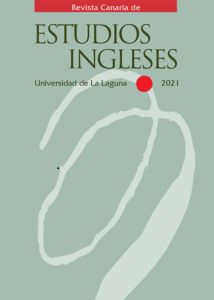A socio-linguistic evaluation of the great modal shift: An overview of the female approach.
Abstract
The great modal shift is a semantic drift that took place in the Late Old English period and continued up to the Present-day, even though the official dates to its end are set in the 15th century. A group of Old English verbs undergoes a semantic colision leading to changes in their meaning as well as their syntax, since they are no longer full verbs, but auxililiaries. The contextual and situational factor that effected this process have not been thoroughly studied. Gendered relations within society and within the religious institutions prove relevant for the abovementioned shift, such as the Benedictine reform. Women as audience, as speakers and as producers (both economic wealth and written material —though women as authors and audience are now just beginning to be the subject matter of many studies). The literary voice of the Anglo-Saxon woman and her indirect role as audience led to changes in the modes of expression. There are, however, earlier periods with similar conditions and the study of possible copies of these early texts will lead us to a better knowledge of the female voice in this period.



